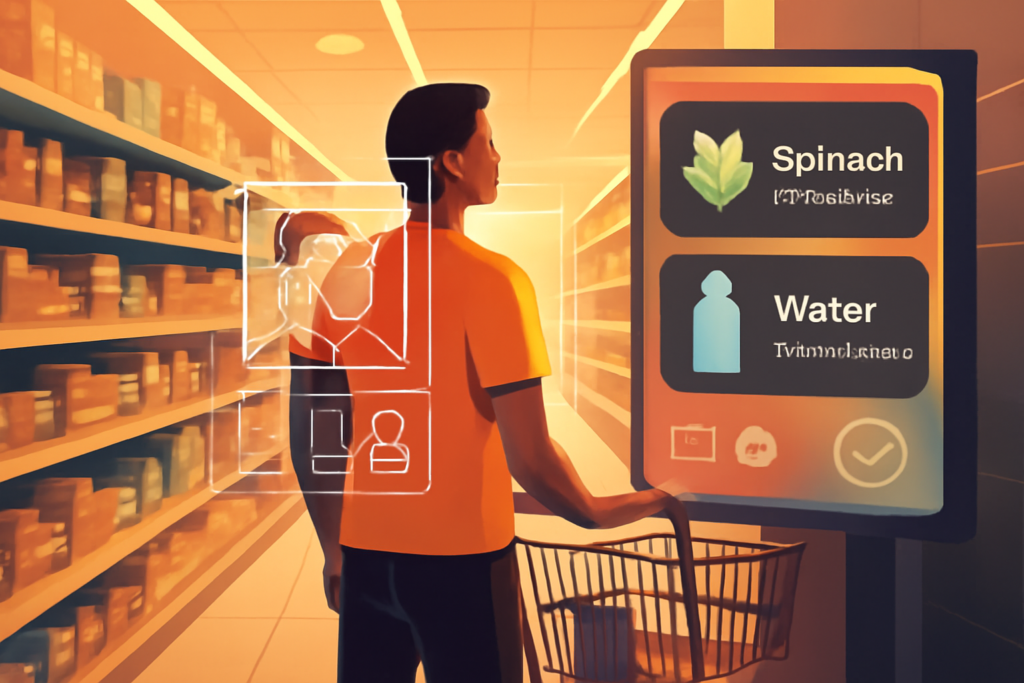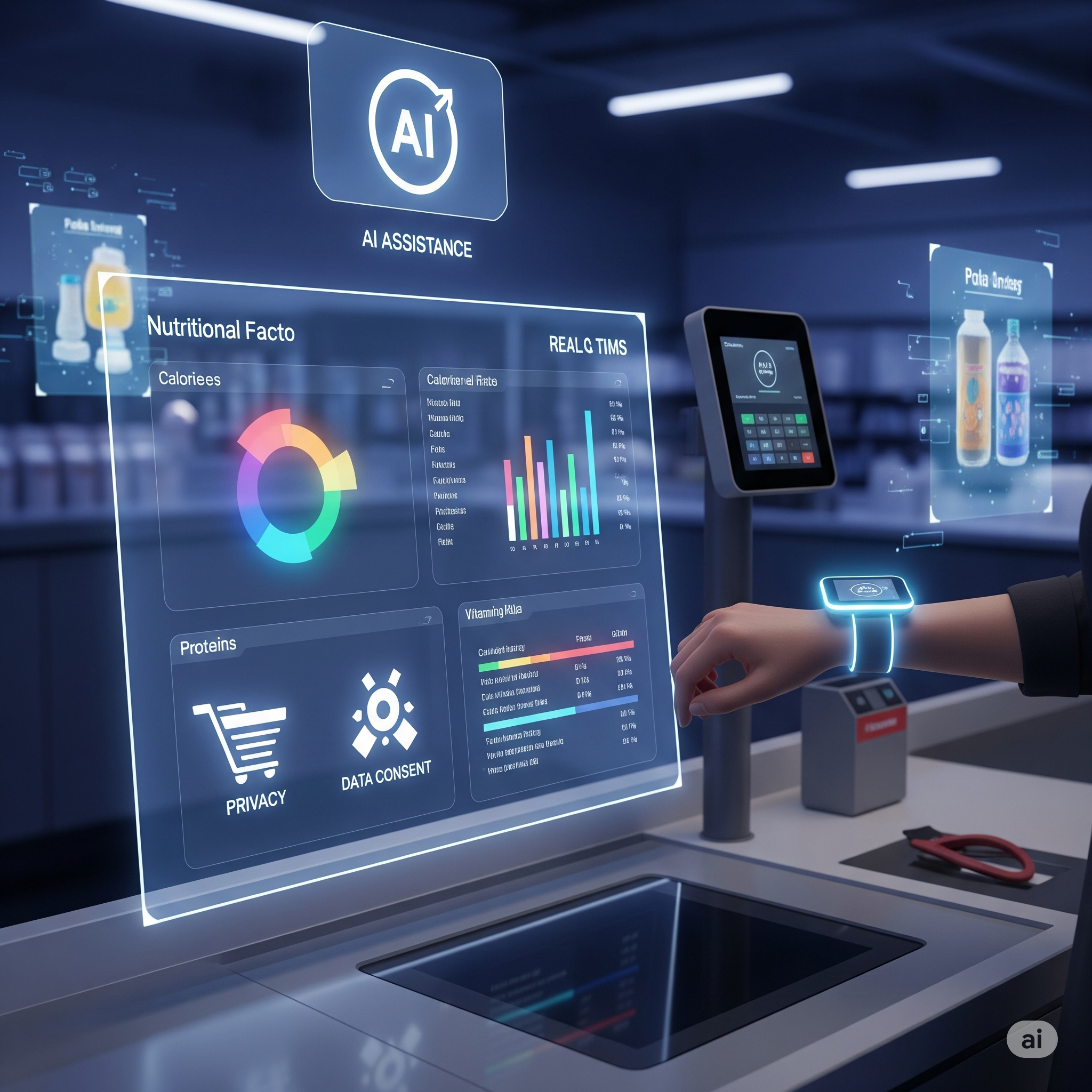Picture this: You’re browsing the food aisle and, as you pause, invisible AI cameras scan your skin tone, posture, and even eye condition. A subtle screen flashes, “Looks like you could use more iron—these spinach wraps suit your needs!” Welcome to the emerging world of AI-powered personalized retail, a realm where the store shelves themselves can “read” your wellness and steer your next snack.
This scenario is no longer futuristic fiction. Thanks to leaps in computer vision, biometrics, and AI nutrition models, tech companies are piloting ways to meld health data with in-the-moment food recommendations. The goal: to nudge everyone toward eating better and living healthier. But with this promise comes a pressing question—where should we draw the line between innovation and intrusion?
Let’s explore what’s possible, the advances driving this space, and the crucial need for robust privacy safeguards.
The Tech: How Does Body-Scanning AI in Retail Work?
What’s Happening Behind the Scenes
- Computer Vision: Cameras, sometimes in smart shelves or ceiling sensors, analyze visible markers such as skin pallor (for anemia), eye redness (possible tiredness or dehydration), or body posture (which may signal fatigue or stress).
- AI Nutrition Models: Machine learning algorithms match observed body cues with likely micronutrient deficiencies or hydration levels, then map those needs to curated food suggestions from the aisle.
- Wearable Integrations: The future could combine biometric data from smartwatches and health trackers, adding heart rate, blood sugar, or sleep stats to real-time food advice.
- Instant Recommendations: A display or your phone receives AI-powered, evidence-based suggestions tailored to your current, detected needs.
Real-World Examples
Brands like Viome, InsideTracker, and ZOE already use microbiome, glucose, and blood marker data (gathered via at-home kits or wearables) to create customized diet plans. These solutions, however, require explicit consent and remain separate from retail environments. The coming leap is seamless in-store scanning—requiring no user action at all. mynucleus custommarketinsights
Why Personalized Nutrition Is So Compelling
- Health Outcomes: Decades of research link better nutrition to reduced chronic disease, improved energy, and superior wellbeing.
- Motivation: Personalized, targeted recommendations boost adherence—people stick with interventions when advice is relevant and timed “in the moment.”
- Convenience: No lengthy logging or nutritionist appointments—just actionable tips as you shop.
The Benefits: Who Stands to Gain?
- Consumers: On-demand guidance for optimal food choices and early warning of potential health issues.
- Retailers: New ways to build loyalty, increase healthy product sales, and differentiate the shopping experience. trueid ultralytics
- Healthcare: Bridges gaps in preventive care and nutrition literacy, especially for those not regularly seeing doctors.
The Risks: Why Privacy and Ethics Can’t Be Afterthoughts
With great data comes great responsibility. Here’s what’s at stake:
1. Consent and Transparency
- Surprise Scanning: Customers may not realize they’re being scanned, or know what data is collected and why.
- Opt-in Required: Effective, ethical practice means users must knowingly and freely consent to scanning and data use—not through fine-print notices, but active, visible choices.
2. Data Security and Misuse
- Even “anonymized” biometric data can often be re-identified, as research shows, making leaks and breaches a major concern. bmcmedethics
- Health information could be shared with marketers, insurers, or third parties, raising risks of discrimination, denied coverage, or targeted advertising. trustarc
3. Feeling Monitored or Judged
- Constant surveillance creates discomfort. People may feel pressured to “perform health” or shame over perceived deficiencies.
- Sensitive populations—those managing eating disorders or body image issues—may be especially impacted.
4. Bias and Fairness
- AI trained on homogenous or limited datasets might misinterpret health indicators for diverse skin tones or conditions, leading to poor (even dangerous) recommendations.
The Regulatory View: What Does Compliance Look Like?
- Data Minimization: Only collect what’s strictly necessary for a stated purpose.
- User Control: Allow people to see, modify, or delete their data—at any time.
- Security: Top-tier encryption and strict controls on who accesses biometric or health insights.
- Fairness Audits: Test AI nutritional models and their outputs must be regularly to prevent algorithmic bias or unfair marketing.
Emerging privacy laws, like the EU’s GDPR, California’s CCPA, and new digital consent standards worldwide, already require these protections in health and retail tech. trustarc
Will Shoppers Accept AI Health Scanning?

Surveys and pilot programs suggest:
- Many people welcome tailored health advice—when it’s opt-in and they can control the experience.
- Trust erodes rapidly if shoppers feel data is harvested without permission, or if recommendations cross into “creepy” territory. trueid
The Bottom Line: Innovation with Guardrails
Personalized, AI-driven nutrition in retail could genuinely revolutionize public health. But without robust protections, it threatens to turn every supermarket into a site of digital surveillance.
Retailers and tech companies must:
- Build in explicit, easy-to-understand consent steps.
- Offer full transparency about what’s collected, why, and how it’s secured.
- Prioritize user benefit, not just sales or marketing insights.
- Strictly separate health data from third-party marketing, insurance, or unrelated profiling.
Ethical AI, not surveillance AI, should power tomorrow’s healthy shopping.
FAQs
Can AI really diagnose nutritional deficiencies accurately?
AI can flag likely risks, but cannot confirm medical diagnoses. Always consult a healthcare provider for conclusive answers.
Can I refuse to be scanned in a smart retail environment?
Ethical implementations should offer clear, opt-out choices—look for visible signs or ask staff about your privacy rights.
What if my data is misused or leaked?
Health and biometric data are protected by law in many places. Report suspected misuse to privacy authorities and demand deletion of your records.
Are there positive real-world outcomes?
Yes—personalized suggestions help improve diets, but should always empower, not pressure, the shopper.
Technology Is a Tool—Use It Wisely
As AI alters everything—even the way we shop for food—the systems that support healthier choices must also defend our rights. Transparent consent, secure data, and people-first ethics are non-negotiable. If retailers and technologists get this right, the result could be a truly transformational blend of shopping, self-care, and digital trust.









+ There are no comments
Add yours